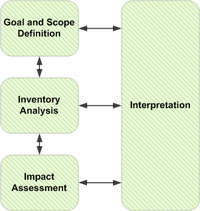
Photo from wikipedia
Purpose The purpose of this paper is to evaluate the effectiveness of the comply-or-explain principle in the Italian context. In particular, the analysis will evaluate, which factor impact on firms'… Click to show full abstract
Purpose The purpose of this paper is to evaluate the effectiveness of the comply-or-explain principle in the Italian context. In particular, the analysis will evaluate, which factor impact on firms' voluntary adoption of this tool to adequate their non-financial reports to the legal requirements of Directive 95/2014/EU. Design/methodology/approach The methodology consists of two different levels of analysis. The first part is statistical descriptive, and it consists of a rhetorical analysis on the justifications provided by the firms about their omissions to comply with Directive 95/2014/EU. The second part is inferential and its aim is to evaluate, which factors impact on comply-or-explains adoption. Findings The findings reveal how the comply-or-explain application in Italy has been characterized by several criticisms. The result highlight how the justifications adopted by the firms is influenced by their sector of activity and omission's type. Moreover, the analysis suggests how the sector of activity and the level of adherence to global reporting initiative influenced the average number of omissions. Research limitations/implications The limitations of the research are represented by the focuses on a single country and by the short period of analysis. In this sense, future research could be addressed to the analysis of countries different from Italy. Moreover, accounting scholars could provide further contributions to the political debate through the evolution of the “comply-or-explain” principle’s strategies over the years. Practical implications The practical implications connected to the present research are twofold. The first one is represented by the possibility for policymakers to increase the degree of attention about the use of comply-or-explain as legitimization's tool. The second one is represented by the possibility for practitioners to identify a new reporting framework. Social implications The social implications are represented by the possibility for stakeholders to evaluate the reliability's degree of the disclosure produced by Italian public interest entities after the implementation of Directive 95/2014/EU. Originality/value Despite the growing attention paid by academics regard Directive 95/2014/EU, this is the first attempt to analyze the comply-or-explain from a rhetorical perspective.
Journal Title: Sustainability Accounting, Management and Policy Journal
Year Published: 2020
Link to full text (if available)
Share on Social Media: Sign Up to like & get
recommendations!